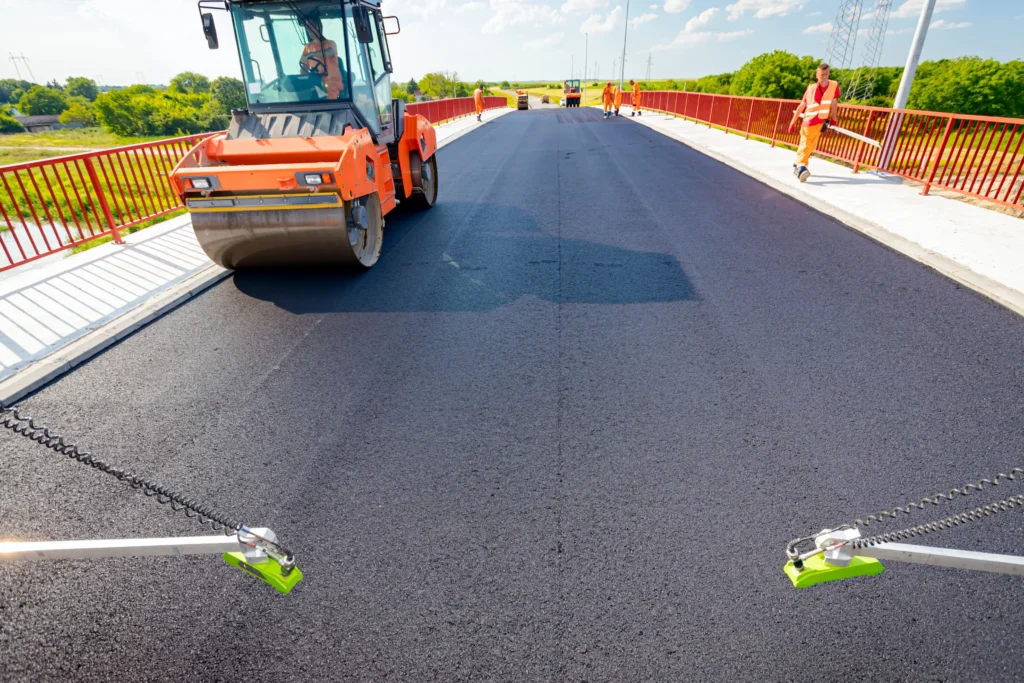Asphalt is a mixture of bitumen (a by-product of petroleum refining), sand, gravel, and crushed stone.
The sticky nature of bitumen serves as the binding material between the various components.
Often sought after for its low initial cost and ease of installation, asphalt is the most common paving material in most commercial settings.
Besides being visually appealing, an aspect provided by the various colors, asphalt performs well under different climatic conditions.
However, the material comes with its fair share of limitations.
To help you make an informed decision when considering asphalt for commercial paving, this article explains the pros and cons you stand to encounter with it.
Pros

Commercial Asphalt paving explained
Ease of Installation
Compared to other paving materials such as concrete, asphalt is easier to install. With the mixture ready and hot, all you need is to just pour it on the prepared pavement and spread it. Unlike concrete, asphalt needs just a few hours to a day before it can be used, an aspect provided by its fast curing and drying process. The expedited installation and drying go a long way in reducing the initial cost while at the same time, serving perfectly in scenarios where fast turnaround is needed.
Cost-Consciousness
Asphalt is mainly sought after for its reduced initial and maintenance costs. The initial cost of asphalt paving ranges somewhere between $3 and $5 per square foot, compared to $5-$7 per square foot of concrete. The reduced initial cost can be explained by the reduced turnover time and low maintenance cost. Another aspect that contributes to the reduced cost of asphalt paving is the availability of the materials used to make it.
Smooth Surface
Upon settling and drying, the petroleum products used in making asphalt float, forming a smooth surface. The smooth surface provides a soft contact that reduces wear and tear on shoes and vehicle tires. In addition to being smooth, the surface is hard enough to prevent the chippings from ablation, something that adds to its extended lifespan.
Resistant To Vegetation Growth
As you may be aware, the growth of mosses, molds and algae is a common problem on concrete pavements. At the same time, other forms of vegetation such as weeds can thrive in cracks on concrete pavements. Besides reducing the visual appeal, they are a safety hazard since they make the surface slippery. The petroleum products used to make asphalt hamper vegetation growth thereby aiding in visual appeal and extended lifespan of the material.
Sustainability
Another benefit that accrues from asphalt as a commercial paving material is the fact it is completely recyclable. This also goes on to explain the reduced initial cost associated with the material. On the flip side, the material releases greenhouse gases into the atmosphere, thereby playing a part in climate change.
Cons
Reduced Lifespan
The main limitation associated with asphalt as a material for commercial paving is the reduced lifespan. The material expands and contracts with temperature fluctuations, putting it at risk of damage from cracks. Compared to other pavement materials, asphalt has the shortest lifespan, an aspect associated with periodic maintenance needs.
Regular Maintenance
Due to the frequent cracks caused by temperature fluctuations, the material will need periodic maintenance to restore its original glory. It is imperative to note that the regular maintenance cost may equal or surpass the reduced initial cost. You must therefore consider the cost aspect carefully before settling on the material for your pavement needs. If you are looking for a pavement material that will last longer, without periodic maintenance, you might want to explore other options. Regular sealing of the material is needed to prevent the composite materials from ablations by feet and vehicle tires.
Environmental Concerns
The material does not resonate very well with environmental conservation enthusiasts. The greenhouse gases produced by the material increase your carbon footprint. This in turn worsens the effects of climate change.
From resistance to vegetation growth, ease of installation, reduced initial cost, and smooth surface, to sustainability, the benefits of asphalt pavement surpass the few limitations associated with the material. The great news about the material is the array of styles of asphalt pavement. You can choose to have your commercial pavement in different styles ranging from black, blue, and grey. Although you will have to encounter some challenges such as short lifespan and periodic maintenance, the material will be value for your money. Most importantly, consider contracting the installation to a professional to enjoy the full benefits guaranteed by this pavement material.




